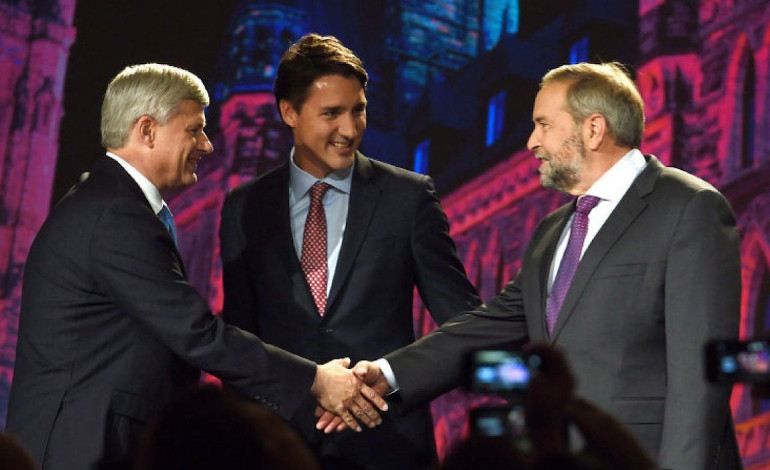Written by Socialist Alternative members in Alberta.
Socialist Alternative interviewed Tanner Layton, a striking Faculty and Socialist Alternative member.
On the morning of February 10, after failed negotiations between the University of Lethbridge Faculty Association (ULFA) and the University’s Board of Governors, the ULFA began legal strike action.
How long have you been part of the University of Lethbridge faculty? What do you do?
I’ve been a part of the faculty for two semesters. I’m a sessional teacher (that means I don’t have any job security; I am hired one semester at a time).
How many people are on strike, and what are their jobs?
Between 500 and 600 members. The faculty ranges from sessional teachers to full-time tenured professors who have been at the university for many years. Faculty do a combination of teaching, research and service.
What are the differences in working conditions now compared to when you started?
I was a U of L student first, so I have a sense of how things looked before. I think the causes underlying the strike have been bubbling under the surface for a decade or more. The faculty have accepted a number of successive poor deals over that time. We have stopped receiving cost of living adjustments when signing new contracts, and these poor deals have compounded to result in significant pay cuts.
The President, for example, gets over $500,000 a year! ULFA gives the example of a senior, full-time member of academic staff who even with pay increases due to merit, only had a real pay increase of 0.85 percent (adjusted for inflation) over the last four years. In the same period, a senior administrator had a 26 percent increase in salary over inflation.
What are the biggest issues faced by the faculty at the U of L? Which of those have been brought up at the bargaining table?
All of the biggest issues have been brought up at the bargaining table. I think the key issues are:
- Salaries are not reflective of the market value of employees and continue to fall behind rising costs of living. U of L Faculty are paid on average 10-15 percent less than what our institution has decided are our comparator institutions. If this trend continues, our institution risks losing our competitive edge relative to our comparators for attracting and retaining high quality Faculty.
- Decision making, or collegial governance. The larger decisions that impact where the university is going are not made by the faculty: we have very little, if any, role to play. There seems to be little or no respect or consideration for us. The faculty have been left out of decisions regarding the restructuring of benefits, which we share the cost of, and the partnership with Navitas.
- Concerns around sessional and part-time/precarious faculty. No job security, little to no benefits, and low pay. I am getting paid more while on strike, actually.
- Workload issues. Members are increasingly being asked to do more and more work (e.g., take on additional courses each term), without additional compensation.
- Academic freedom has been subject to the business interests of the university. Students are paying more than ever in tuition, but there have been substantial cuts to student support services. The university is being treated like a business.
We released a video that goes into detail about why many of us voted yes to striking.
Negotiations between the ULFA and the U of L Board of Governors broke down, resulting in the strike. Which issues has the board been unwilling to make any concessions on?
They’ve been completely unwilling to move on any of the big issues: it’s come to a complete standstill. There have been no further negotiations since we started striking. Now we are just looking for ways to get them to the table.
Is there broad support for the strike among ULFA members? What has the broader community response been like?
The strike vote was a 92 percent yes with 87 percent of members voting, a really strong strike vote. We’ve seen overwhelming support among the community.
How have students been affected? Have they been supportive?
The students have been very supportive. There was a student-led rally right before we went on strike that a couple hundred students attended. Students are standing in solidarity with us on the picket line! A virtual student and parent town hall had over 200 in attendance, and the Student Solidarity Action council has grown. Still, students have a range of understandings about this issue and a range of opinions about it. It’s difficult for all of them because of the extra stress and uncertainty. The fear mongering that has been communicated by the board has only made the situation worse. For example, the administration has sent emails warning students that a strike will cost them credits for their courses, something which has never happened in Canadian history!
How are U of L administrators reacting to the strike?
Senior administrators are displeased with the strike. They have hired what we assume are private investigators to spy on us on the picket line, and they have tried to mislead the public about what the ULFA wants in a new contract. They’ve been unwilling to meet with us, have locked us out of our institutional email, prevented us from approving timesheets for student employees, and have been unwilling to make concessions on language issues.
What is the mood of the strikers?
Lots of amazing solidarity on the picket line — there’s so much support from local unions and other faculty associations across the country. We had flying pickets with representatives from University of Northern BC, University of Manitoba Faculty Association (who recently won their own dispute), Alberta Union of Provincial Employees, United Nurses of Alberta, Alberta Teachers’ Association, Canadian Association of University Teachers (and more) to support us! Volunteers cooked and served large batches of food, there were musical and other performances from students, from the Lethbridge Raging Grannies, and others. We are all working hard, despite cold weather and stressful times, to keep morale high and to pressure the Board to return to the table. We have the strength and support to see it through to the end.
What is the union doing to increase pressure on management?
We are picketing every day from 8 in the morning to 5 at night, sometimes in temperatures as low as minus 19. We put out regular information blogs, memes, infographics, and calls to action to try and inform the public about the real nature of the situation. We also hosted town halls with parents and students to answer questions and keep people informed.
Do you think the ULFA will be able to sway any members of the board to their side, like the student or public representatives?
We hope so, however, all we ask is that each board member look at this strike/lockout objectively. Stalling at impasse without continued negotiations only serves to hurt our students and cause financial and other damage to our institution. It is in everyone’s best interest to come to the table and make a deal that resonates with our members’ core values (equity, parity, and respect).
Do you think the UCP’s ongoing cuts to post-secondary funding have played a role in the board’s hostility during negotiations?
The UCP’s cuts have been an underlying factor for the board in these negotiations. In fact, their negotiation team recently hired Dwyane Chomyn, a union-busting lawyer with ties to the UCP!
What impacts on education have you seen because of the cuts?
Increased class sizes, disintegration of funding for non-STEM and non-business faculties, rising tuition costs for students, and fewer opportunities for independent studies and applied research.
After the strike, do you think the ULFA will have the energy to take the fight to budget cuts?
Personally, I would love that. We have talked about the upcoming budget a lot, and the board might be refusing to negotiate to wait us out until that budget is passed. It seems like there are some hidden directives from the UCP shaping the board’s strategy. These budget cuts are something faculty associations, teachers’ unions, and students will have to unite against. We will be more organized and more passionate about protecting the sector than ever before.
What can supporters do to assist the strike?
Supporters can send critical emails to the university administration, or financially support our job action here. We would appreciate workers getting their unions to send solidarity statements to us as well. Post about your support on social media, using the hashtag #ulfastrike. Of course, stand with us on the picket line!
Any final comments?
I think in the context of this strike, and such immense student support, I can see students becoming conscious of what they are being made to serve in neoliberal post-secondary institutions. They’re showing that another view of education, and a more equitable society, is not only possible, but can be won through struggles of this kind.




